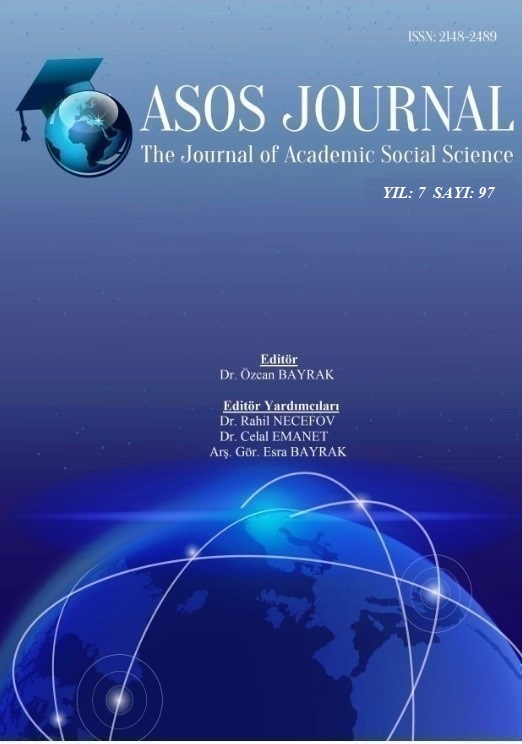PSİKOLOJİ BİLİMİNİN KÖKENİNİ ANLAMAK AÇISINDAN ORTAÇAĞ VE RÖNESANS AVRUPASI İLE TÜRK- İSLAM MEDENİYETİNİN BAKIŞ AÇISININ KARŞILAŞTIRILMASI
Author :
Abstract
Bu çalışmada psikolojinin bilim olma sürecinde ortaçağ, Rönesans ve Türk-İslam medeniyetlerindeki varoluş yolculuğu karşılaştırmalı olarak ele alınmıştır. Psikolojinin bilimsel çerçevede gelişim sürecini anlamak için antik dönemlerden yola çıkarak düşünce tarihini anlamak gerekir. Antik Yunan dönemindeki felsefi oluşumlar, yaklaşımlar ve bakış açısı daha sonradan Avrupa ve Türk İslam toplumlarında yetişen düşünürlere, bilim adamlarına adeta bir pusula gibi yön vermiş, destek olmuştur. Tabiî ki bu konudaki yaklaşımları sadece Antik Yunan felsefe öğretileriyle sınırlamak doğru bir yöntem değildir. Eski mısır, Babil, Sümer ve Hitit bilim ve felsefi yaklaşımları da zemin oluşturmada önemli bir paya sahiptir. Bu araştırma da psikoloji biliminin doğuş ve gelişiminde etkili olan unsurlar ve farklı toplumlarda ki gelişim aşamaları incelenmektedir. Felsefi eğilimler, din, kültürel boyut gibi birçok faktörün psikoloji bilimine bakış açısını nasıl etkilediği ve yansımalarının ne olduğunu bilmek, kökene inmek bu bilim dalının anlaşılması açısından çok önemlidir.
Keywords
Abstract
In this study, the journey of existence of medieval, Renaissance and Turkish-Islamic civilizations in the process of becoming a science is discussed comparatively. In order to understand the development of psychology in the scientific framework, it is necessary to understand the history of thought from ancient times. The philosophical formations, approaches and perspectives of the ancient Greek period have led the thinkers and scientists who grew up in European and Turkish Islamic societies as a compass. Of course, it is not the right method to limit the approaches on this subject to the teachings of Ancient Greek philosophy. Ancient Egyptian, Babylonian, Sumerian and Hittite science and philosophical approaches also play an important role in forming the ground. In this research, the elements that are effective in the birth and development of psychology and the stages of development in different societies are examined. Knowing how many factors such as philosophical tendencies, religion and cultural dimension affect the point of view of psychology and its reflections is important for understanding this discipline.
Keywords
- Ömerustaoğlu, Adnan( 1999) ,ThomasS. Kuhn’un Bilim Felsefesi. Atatürk Üniversitesi .SBE Doktora Tezi ,Erzurum.
- Çakmak,C, Yıldız,N ve Uslu,S. ( 2012), İlkçag Felsefesi, Anadolu Üniversitesi Yayınları, Eski- şehir.
- Alan, Sümer,B,(2011), Parmenides’in Düşünme ve Varlık aynı ŞeydirYargısına Heidegger’in Yorumu Açısından Bir Bakış . Felsefe ve Sosyal Bilimler Dergisi,Sayı:11.
- Zangwill,O,L,( 1990),Modern Psikolojinin Gelişimi( Çev: Yılmaz Özakpınar),Konya.
- Feynman,R( 2003), Fizik Yasaları Üzerine( Çev: N.Arık),Tübitak Yayınları, Ankara.
- Keklik,N( 1984), Türk İslam Filozoflarının Avrupa Kültürüne Etkileri, İstanbul Üniversitesi, Felsefe Arşivi,Sayı:24.
- Tuğcu,T( 2003),Batı Felsefesi Tarihi ( 4.Basım ), Alesta Yayınları, Ankara.
- Karakaş,S, Kafadar,H,Bekçi,B( 2001) ,Beyin Zihin İlişkisinde Büyük Düşünürler ve Kuramlar: Pozitif Bilim Dalları için Doğurgular, Nöropsikiyatri Arşivi38(1)
- Yörükoğulları,E,Orhun,Ö,Topdemir,H,G, İhsanoğlu,E ( 2013).Bilim ve Teknoloji Tari- hi,Anadolu Üniversitesi yayınları,Eskişehir
- Akarsu,B( 1979), Çağdaş Felsefe Akımları, Milli Eğitim Basımevi, İstanbul.
- Cevizci, A( 1999), Ortaçağ Felsefesi Tarihi, Asya Kitabevi, İstanbul.
- Topdemir,H,Gve Unat, Y ( 2009),Bilim Tarihi, Pegem Yayınevi, İstanbul.
- Nasr, S,H( 1991), İslamda Bilim ve Medeniyet,İnsan Yayınları, İstanbul.
- Sezgin, F( 2007), İslamda Bilim ve Teknik, Cilt 1.Türkiye Bilimler Akademisi ve Kültür Tu- rizm Bakanlığı Yayınları, Ankara
- Sezgin,F( 2004). İslam Kültür Dünyasının Bilimler Tarihindeki Yeri, Türkiye Bilimler Akade- misi Yayınları, Ankara.
- Baymur,F( 1994). Genel Psikoloji,İstanbul
- Babaoğlu,Ali( 2002),Psikiyatri Tarihi,Pegem Yay, İstanbul.
- Frank,Bruno( 1996).Psikoloji Tarihi( Çev: Gül Sevdiren),Remzi Kitabevi, İstanbul.
- Erdem ,Hüsamettin( 1999).Bazı Felsefe Meseleleri,Konya
- Erdem, Hüsamettin( 2000) İlkçağ Felsefesi tarihi, Konya.
- Taylan, Necip( 2006). İslam Felsefesi,Pegem Yayınları,İstanbul.
- Hökelekli,Hayati( 2005).Din Psikolojisi,Ankara.
- Sunar, Cavit( 1972).İslamda Felsefe ve Farabi,Ankara
- Peker, Hüseyin( 2003).Din Psikolojisi,Çamlıca Yayınları, Ankara.
- Alper, mahir(1999). ‘’İbn-Sina’’,DİA,C.XX,Ankara.
- Karlığa,Bekir(1999).’’İbn Rüşd’’,DİA,C.XX,Ankara.
- Küken,Gülnihal(1996).Doğu-BatıFelsefesi Etkileşiminde İbn Rüşd ve St.ThomasAquinas Felse- felerinin Karşılaştırılması,İstanbul
- FancherD,Raymond,E(1997).Ruh Bilimin Öncüleri( Çev: Aziz Yardımlı),İstanbul.
- Schultz,Duane ve Sydney,Ellen,Schultz( 2002).Modern psikolojiTarihi( Çev: YaseminAs- lay),İstanbul.
- Şimşek,İsmail( 2015).Felsefeden Tasavvufa Ruh Anlayışı,EKEV Akademi Dergisi,Yıl: 19( 62),İstanbul.
- Aydın,Hüseyin ( 1976).Muhasibinin Tasavvuf Felsefesiİnsan Psikoloji bilgi Ahlak Görüşü,Pars Matbaa,İstanbul.
- Gürsu, Orhan (2016). İslam Düşünürü Belhi nin Ruh Sağlığına Yönelik Görüşlerinin Modern PsikolojiDoğrultusunda DeğerlendirilmesiDEUİFD,Din Psikolojisi Özel Sayısı.
- Songur, Haluk , Saygın, Tuba ( 2014). Şifahaneden Hastaneye: Sağlık Kuruluşlarının Değişimi- ne Genel Bir Bakış,Süleyman Demirel Üniversitesi,Sosyal Bilimler Enstitüsü Dergisi.Yıl:1 ,Sayı:19.
- Kula,Tahsin ( 2017). El-Muhasibi ye Göre Riyanın İnsanın Olumsuz Kişilik Yapılanmasına Etkisi,Dicle Üniversitesi ,Sosyal Bilimler Enstitüsü Dergisi,Yıl.9,Sayı:19.
- Yıldırım, Cemal ( 1992),Bilim Tarihi, Remzi Kitabevi, İstanbul.
- Hatunoğlu, Aşkım. (2014), Psikoloji Biliminin Oluşum ve Gelişimine Katkıda Bulunan Doğu İslam Medeniyeti, ASOSJOURNAL (The Journal of Academic Social Science), Elazığ.





